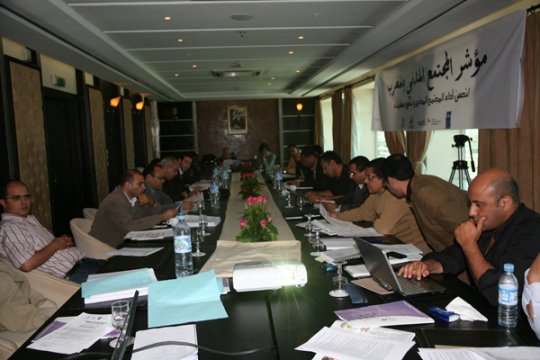Morocco
|
Published on Thu, 2012-03-15 11:40
In terms of gender equity Morocco is below the Middle East and North African average, and in far worse situation than all of its neighbours. Morocco’s is one of the largest gender gap in the region. |
Published on Mon, 2011-06-06 13:00
Sources: IPS, Al Jazzeera, Los Angeles Times Thousands poured into the streets of Rabat, the capital of Morocco, on Sunday Jun. 5 and also in Casablanca to condemn the death of a protester and to demand the country-wide government crackdown on peaceful demonstrations reaches an end. The protesters are part the February 20 Movement, led largely by young people demanding pro-democracy reforms and an end to government corruption and repression – as well as an end to poverty and inequality. |
Published on Fri, 2011-05-06 16:29
Source: “Le Matin”, Moroccan newspaper The main francophone Moroccan newspaper, Le Matin, expressed its support to the consultation process launched by the Associative Space, focal group of Social Watch in that country, towards the United Nations Conference on Sustainable Development (“Río + 20”), to be held in Rio de Janeiro in June 2012, the same as the long remembered 1992 Earth Summit. Furthermore, the process reflects the current approach of Social Watch to sustainable development issues, on which its next annual report will be focused. |
|
Source: . Published on Sun, 2011-05-01 14:42
La société civile invitée à participer à la préparation de la Conférence des Nations unies sur le développement durable qui se déroulera en juin prochain à Rio. |
|
According to official follow-up reports on the Millennium Development Goals (MDGs), Morocco has made progress towards several of the goals and is on the way to achieving others. However, this conclusion is based on a purely quantitative focus and does not reflect the real human development situation in the country. There are problems in the implementation of the scant official development assistance (ODA) that Morocco receives. In education, these impede any concerted efforts by the Government and civil society organizations to eliminate illiteracy and provide universal access.
|
|
Morocco’s heavy dependence on the world economy has made it vulnerable to the global economic crisis. A drop in the demand for Moroccan exports, the sharp reduction in remittances and a severe inflationary process are some of the worst effects. The scant success of anti-crisis policies promoted by the Government aggravates the situation and increases social instability. New proposals arise from the unions and civil society in order to create new conditions for a more equitable economic and social model.
|
|
Published on Fri, 2009-08-21 10:34
This month, “Spotlight On…” will turn its attention to the Middle East, to take a look at the experience of the Social Watch coalition in Morocco, one of the most broad-based and active groups of Watchers in the Maghreb region, who will be hosting this year´s regional capacity building workshop in October. |
SUSCRIBE TO OUR NEWSLETTER





